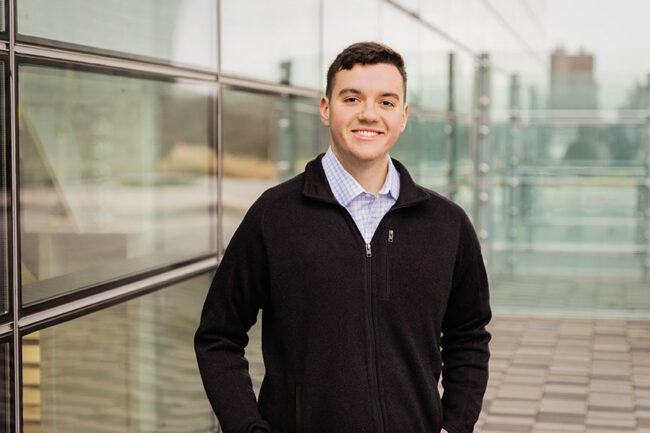At age 15, Russell received a long-awaited diagnosis of Facioscapulohumeral Muscular Dystrophy (FSHD). After two years of seeing various specialists, wondering what could explain his symptoms, and constant invalidation from healthcare providers, Russell finally received an explanation for his pain and limitations. In some ways, Russell found relief in his diagnosis as he could finally explain his condition to others and seek appropriate accommodations in school and athletics. Yet, at the same time, facing a rare and progressive muscle disease at a young age was daunting and heartbreaking.
The hardest part of my diagnosis was that I had dysfunction, but I wasn’t honest with myself that I had limitations. And because I wasn’t honest with myself, I couldn’t be honest with others.
While coping with an FSHD diagnosis was challenging, Russell chose to channel his frustration into another avenue: advocacy. Russell dove in and decided to become an integral part of the FSHD community. As a high school volleyball player, Russell and his team founded an annual event to fundraise for FSHD research and raise awareness. Shortly after, Russell became connected with the FSHD Society, the world’s largest research-focused patient organization for FSHD. Russell is now an ambassador for the FSHD Society and connects with newly diagnosed people to share his journey with others his age.
When Russell reached college, he found new avenues to further his commitment as he gained experience researching muscular dystrophies in a laboratory, including FSHD and Duchenne muscular dystrophy. Motivated by a long and frustrating diagnostic journey, Russell is attending medical school with the hopes of using his platform as a future physician to elevate the voices of people living with rare diseases and to ensure that their needs are met.
One of the core reasons I wanted to go to medical school to become a doctor was to prevent others from experiencing the challenging diagnostic odyssey that I endured.

While Russell strives to maintain a positive outlook, he faces challenges with pain and everyday tasks. As a result, asking for accommodations has become a persistent component of his professional and personal life. In addition, explaining his condition can be emotionally exhausting as people often discredit his diagnosis because not all of his limitations are visible to others.
In a lot of ways, FSHD can be an invisible diagnosis. A lot of people don’t know from looking at me that I have a muscular dystrophy or that I have difficulties with certain tasks and aspects of daily living.
Despite these everyday challenges, Russell remains determined not to let FSHD weigh him down. Today, he enjoys hiking, fishing, reading, and traveling in his spare time. He is hopeful that soon there will be a treatment and ultimately, a cure for the condition. A few key ways Russell maintains a balance and manages his symptoms involve listening to his body and being conscious of certain parts of his body becoming overworked. Meeting with a physical therapist has been essential to achieving this balance while ensuring his actions are smart and safe. Sharing his practices and what has worked for him remains paramount as he connects with new patients and encourages them to keep moving forward.
Be honest with yourself and don’t give up hope. There’s research happening and there are things you can do to try to help yourself. You have to be your own advocate.